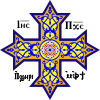Saint Macarius of Alexandria | |
|---|---|
 | |
| Monk, Ascetic | |
| Born | c. 300 Egypt |
| Died | 395 Egypt |
| Venerated in | Eastern Orthodox Church, Roman Catholic Church, Oriental Orthodoxy |
| Feast | 19 January (Eastern Orthodox and Roman Catholic Church) 1 May (= 6 Pashons, 111 A.M.) (Coptic Orthodox) |
Saint Macarius of Alexandria (Greek: Μακάριος; died 395)[1] was a monk in the Nitrian Desert. He was a slightly younger contemporary of Macarius of Egypt, and is thus also known as Macarius the Younger.[2]
YouTube Encyclopedic
-
1/5Views:1 0994 26939 1373 8651 917
-
Fifty Spiritual Homilies of St Macarius the Egyptian Full Audio Book English Unabridged
-
Coptic Bishop of Kena miraculous death!
-
Midnight praises by the monks of St. Macarius Monastery 1977
-
Father Wadid from St Macarius Monastery Egypt
-
Bishop Cherubim on Bishop Macarius and his relationship with Pope Kyrillos
Transcription
Life
Macarius was born about the year 300 in Alexandria. He was a merchant selling confections[3] until the age of 40, when he was baptized and went off into the desert. After several years of ascetic life, he was ordained a presbyter and appointed prior of a monastery known as the "Kellii", or "cells" in the Egyptian desert, between the Nitria mountain and a skete in which monastic hermits lived in silence, each in his own cell.[4]
About the year 335, Macarius of Alexandria retired to live alone as a recluse in el-Natroun desert.[2] Many miracles were ascribed to him. He presided over five thousand Nitric monks.
Having learned of the extremely strict rule for monastic life observed at the Tabbenesiot Monastery, whose prior was Venerable St. Pachomios the Great (+ 348), St. Macarius disguised himself in secular clothing, and over the course of the entire Quadragesima [the 40-day Great Lent] neither ate bread nor drank water.[4] No one saw him eating or sitting down. He was making baskets of palm leaves while he was standing. The monks said to Saint Pachomius: "Cast out this man from here, for he is not human." A divine inspiration subsequently revealed Macarius' identity to him, and the monks rushed to receive his blessings.[2] Having demonstrated humility and taught a lesson to all, St. Macarius returned to his own monastery.
At the age of 73 Macarius of Alexandria was exiled by Emperor Valens, along with Macarius of Egypt to an island,[4] which they subsequently Christianized.
According to Eastern Orthodox tradition, Macarius of Alexandria died on 2 January 395. According to the Coptic Orthodox tradition, he died on 1 May 395. (6 Pashons, 111 A.M.)
In addition to a monastic rule and three brief apothegms, a homily "On the End of the Souls of the Righteous and of Sinners" is ascribed to him, although excellent Vienna manuscripts assign the latter to a monk named Alexander. Palladius and Sozomen also mention a Macarius the Younger of Lower Egypt, who lived in a cell for more than twenty three years to atone for a murder which he had committed.
References
- ^ Lives of Saints :: Bashons 6, CopticChurch.net
- ^ a b c "St. Macarius of Alexandria". www.stabanoub-dallas.org. Retrieved 17 March 2018.
- ^ Butler, Alban. "St. Macarius, of Alexandria, Anchoret", The Lives of the Saints. 1866
 This article incorporates text from this source, which is in the public domain.
This article incorporates text from this source, which is in the public domain.
- ^ a b c "St. Macarius of Alexandria", St. John's Orthodox Church Archived 7 July 2013 at the Wayback Machine
![]() This article incorporates text from a publication now in the public domain: Jackson, Samuel Macauley, ed. (1914). "Macarius the Younger". New Schaff–Herzog Encyclopedia of Religious Knowledge (third ed.). London and New York: Funk and Wagnalls.
This article incorporates text from a publication now in the public domain: Jackson, Samuel Macauley, ed. (1914). "Macarius the Younger". New Schaff–Herzog Encyclopedia of Religious Knowledge (third ed.). London and New York: Funk and Wagnalls.

